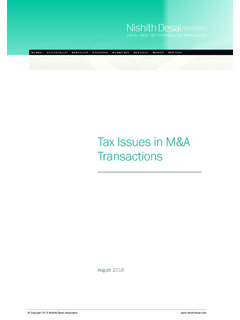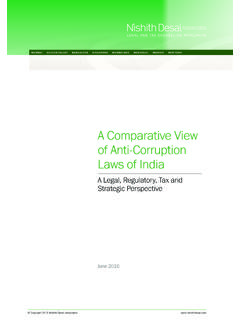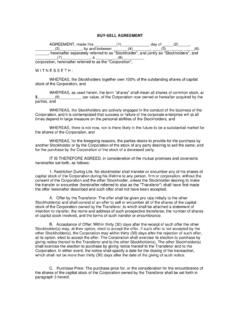Transcription of Pledge of Shares - Nishith Desai Associates
1 36 Banking Frontiers September 2011 FundingFundingThe regulatory change brought about by the RBI vide its Circular 57 recently permits non-resident shareholders of Indian companies to avail of loans from Indian and overseas banks using their shareholding in Indian companies as col-lateral subject to procuring the no-objec-tion certificate (NOC) from the relevant authorized dealers (AD). Accordingly, the requirement to obtain prior approval of RBI for pledging the Indian Shares held by non-residents is dispensed with sub-ject to fulfillment of the conditions pre-scribed.
2 All those major public sector and private banks as well as multi national banks which function as ADs in respect of FDI related transactions can act as AD relating to Pledge of Shares . Under the extant exchange control laws, no person resident outside India is permitted to transfer any Shares , except by way of a gift or sale. Since the term transfer is defined to include sale, purchase, exchange, mortgage, Pledge , gift and loan, an exception was pro-vided only for gift or sale; other forms of transfer such as Pledge were deemed as not being permitted without prior RBI s action is an endeavor to fur-ther liberalize, rationalize and sim-plify the processes associated with FDI flows to India.
3 Ruchir Sinha, co-head, Real Estate Investments Practice, and Arun Scaria, senior member, Corporate and M&A Team, of law firm Nishith Desai Associates , outline wide ranging legal issues associated with the regula-tory change: NON-RESIDENT SHAREHOLDERS The regulatory change would be advan-tageous to both banks and non-resident shareholders of Indian companies, says Sinha, adding: This is a welcome change and can be beneficial to all the stake-holders in such a loan or Pledge . The change introduces a new source of fund-ing for the non-resident shareholders of Indian companies including non-resi-dent Indians.
4 Non-resident shareholders can now leverage on their Indian share-holding to raise monies abroad for their general business purposes without hav-ing to procure any regulatory approval. Loans availed against the Indian share-holding by the non-resident sharehold-ers can mitigate the liquidity crunch of the foreign shareholders, if any. Further, non-resident promoters can now facili-tate funding of Indian companies from Indian banks using their Shares in the Indian company as collateral. He maintains that the relaxation in the process would also ease the time con-straints associated with obtaining prior approval of the RBI, which generally took about 12-14 weeks and was a discretion-ary approval.
5 BANKS As per the circular, Indian banks are per-mitted only to extend loans to the investee Indian company against the Shares held Arun Scaria points out that non-resident shareholders/ promoters of Indian companies can now facilitate bank financing of the Indian companies by pledging their sharesThe RBI has now delegated the power to authorized dealers to allow the Pledge of Shares of an Indian company by non-residents in favor of Indian and overseas banks. Ruchir Sinha and Arun Scaria, senior legal experts from Nishith Desai Associates , discuss ramifications of this major regulatory change: Pledge of Shares Advantage Indian & Overseas BanksFundingBanking Frontiers September 2011 37 Ruchir Sinha feels this is a welcome change and can be beneficial to all the stakeholders in such a loan or pledgeby the non-resident shareholders in such company.
6 Says Scaria: If the loan against Indian shareholding is availed of by the non-resident shareholder or its group companies abroad, then such loan has to be necessarily procured from an overseas bank. Clearly, this regulatory change offers one more collateral that can be taken by banks to secure their loans. We under-stand that the banks generally prefer cre-ating Pledge on the Shares in comparison to other assets of the borrower as Pledge is a relatively liquid form of security espe-cially in case of listed securities. To that extent, this regulatory change should be a favorable step for the banks.
7 Foreign banks are permitted to extend overseas loans to non-resident investors or their group companies against the Pledge of Shares of an Indian company held by the non-resident shareholders. However, this facility will have to be strictly used outside India for business purposes. On the other hand, Indian banks are permitted to grant loans to Indian companies against Shares held by non-residents which monies can be used for genuine business purposes by the Indian company. Therefore, we see that it is beneficial to both Indian and for-eign banks, he investee company also stands to gain.
8 Scaria says the non-resident share-holders/ promoters of Indian companies can now facilitate bank financing for bona fide business purposes of the Indian com-panies by pledging their Shares in favor of the lenders. It goes without saying that this can be a major source of fund-ing for the Indian companies. He feels it is commendable that Indian compa-nies are permitted to leverage on their non-resident shareholding without any regulatory approval, however, it would have been ideal if such liberty to Pledge non-resident shareholding was extended also in favor of regulated financial insti-tutions which play a pivotal role in such lending says invoking a Pledge can be chal-lenging, since the law requires that a fund must immediately sell the Shares upon invocation.
9 Funds are often faced with the dilemma of whether to invoke the Pledge or not. If they invoke the Pledge , then they must ensure that the Shares are sold, which may, apart from hammering the stock, earn a bad name for the fund. If they don t, and the share value falls, an argument can be made that they suf-fered the loss due to their failure to exer-cise their rights on time. The situation is even worse in a private company as there is generally no market for such Shares . In fact, in a private company there is an addi-tional degree of challenge as the closely held boards may even resist the pledgee from invoking the Pledge on account of the transfer restrictions as contained in the charter of the company, says he.
10 DISPUTE RESOLUTIONThe dispute resolution mechanism in cases related with pledging of Shares is getting complex. Scaria says: Till recently, invocation of Pledge on Shares was considered to be an absolute contrac-tual right of the pledgee akin to enforce-ment of a bank guarantee and courts were generally reluctant to come in way. However, the enforceability of the Pledge of Shares has been called in to question after the recent Unitech case. Reports suggest that the promoters of Unitech stalled the move by the debenture trus-tee Axis Trustee Services to sell pledged Shares by securing an injunction from the Delhi high court.


















